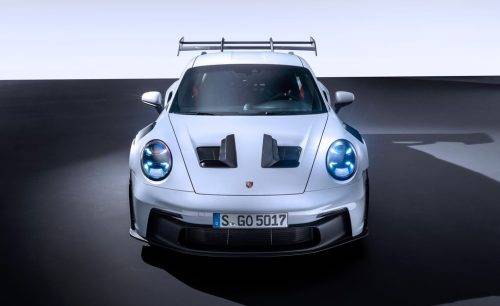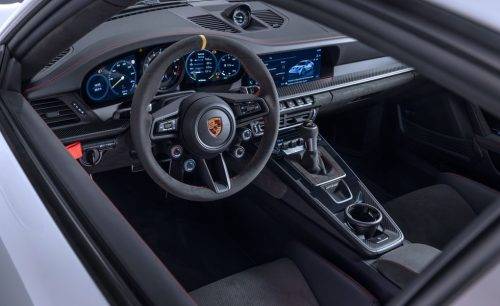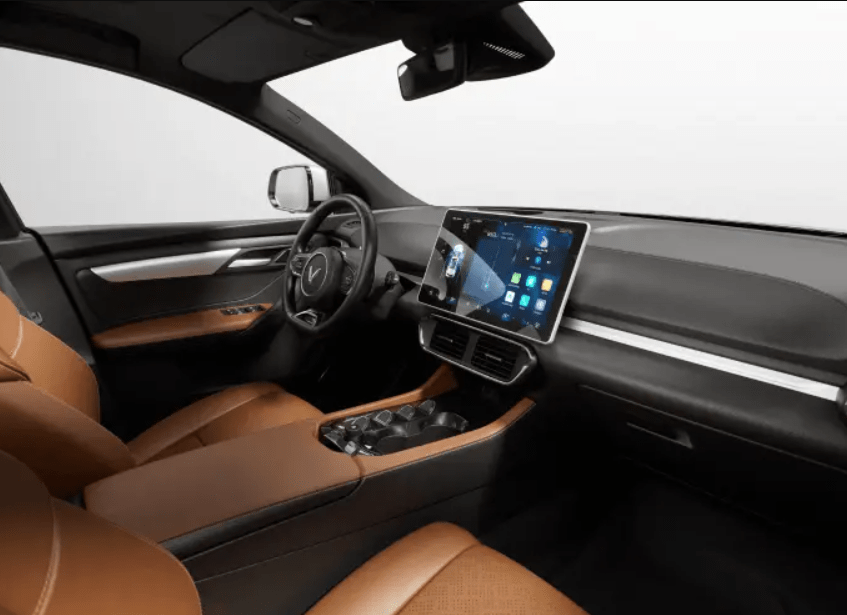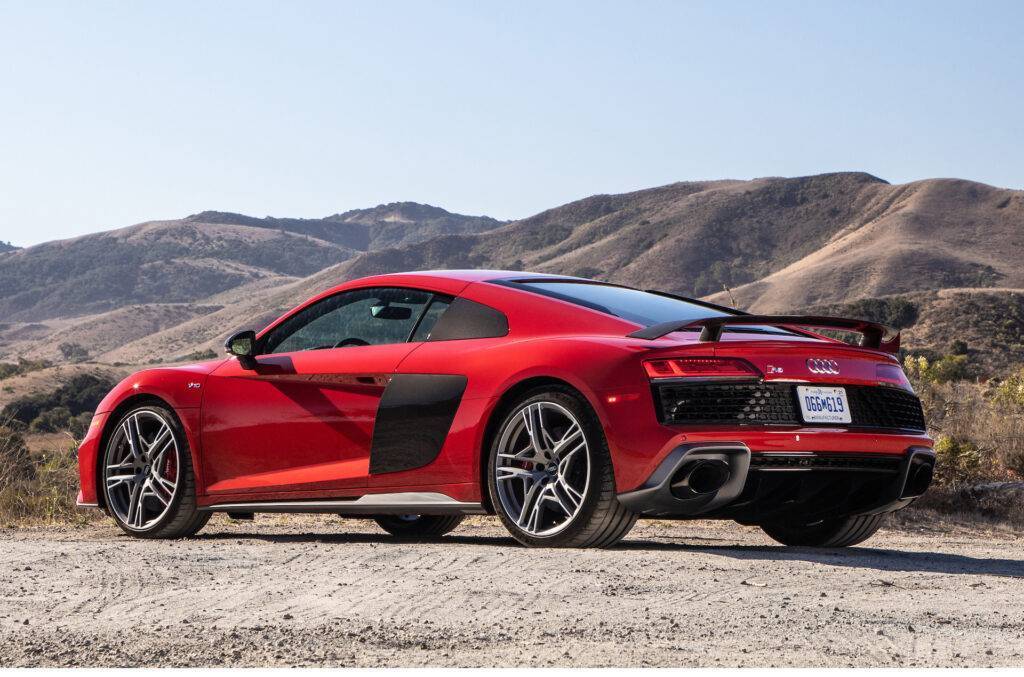BY DREW DORIAN AND ERIC STAFFORD
- HIGHS
Spectacular handling, telepathic steering, a flat-six sent from heaven. - LOWS
Prices that run from expensive to if-we-ever-hit-the-lottery. - VERDICT
The 911 GT3 models are Porsche’s gift to car enthusiasts, special and rare automobiles that make driving—slowly or quickly, on the road or on the race track—a soul-stirring experience.
Overview
Simply put, the 2023 Porsche 911 GT3 and the all-out track-attack GT3 RS are utterly transcendent, blending everything we love about the standard 911 with otherworldly performance, uncompromised driving enjoyment, and hot-lap capability. A naturally aspirated 4.0-liter flat-six engine makes demonic sounds as it howls up to its 9000 rpm redline, producing 502 horsepower along the way in the GT3 and GT3 Touring. That same engine is twisted to 518 horsepower in the new GT3 RS, but it’s that model’s wild race-car aerodynamic elements—ideas cribbed from GT and Formula 1 race cars—that comprise its major engineering advancements. A six-speed manual is standard in GT3 models but we’ve proven the optional seven-speed PDK automatic is quicker, as it shifts quicker than a human and seems to be linked to the driver’s cerebral cortex. The GT3 RS comes only with the PDK gearbox. While the GT3 and GT3 Touring models are designed to thrill on the world’s most challenging race courses, they’re nearly as supple-riding and easy to live with as the regular 911 when driven on city streets. It’s this dual-purpose nature that makes the GT3 one of our favorite sports cars and why it easily earns a place on the highest pedestal of automotive icons. As for the GT3 RS, it’s as serious about lap times as a 911 can get and still be licensed. We can’t wait to drive it to see if it’s too radical a car for anything but track duty.

CHARLIE MAGEE|CAR AND DRIVER
What’s New for 2023?
The top-dog GT3 RS variant joins the lineup this year, complete with a massive rear wing, a race-car aerodynamic package, and a 518-horsepower version of the naturally aspirated 4.0-liter flat-six engine. The GT3 RS looks insane, a video-game race car come to life, and we expect it to hit 60 mph in under 3.0 seconds when we get our hands on it at our testing facility.

CHARLIE MAGEE|CAR AND DRIVER
Pricing and Which One to Buy

As with the last generation, Porsche offers two slightly different versions of the “standard” GT3, the basic winged model and a Touring variant that tones down the racy look by nixing the big rear wing. And then there’s the hardest-core GT3 of them all, the RS. It’s hard to pick just one of the trio to recommend as they’re all incredible cars, but our hearts belong to the absurd GT3 RS.
Engine, Transmission, and Performance
In the tail end of the 911 GT3 is a naturally aspirated 4.0-liter flat-six that makes 502 horsepower. The engine is essentially identical to the one that powered the last 911 Speedster we tested, which spun to 9000 rpm and wailed hypnotically. The GT3 offers both a seven-speed dual-clutch automatic (a.k.a. PDK) or a six-speed manual. The PDK-equipped example we drove showcased the automatic’s intuitive behavior as well as the engine’s spirited responses and intoxicating soundtrack. At our test track, the automatic managed a 2.7-second 60-mph time while the six-speed manual test vehicle snapped off an impressive 3.3-second run to 60 mph. The GT3 RS, which joins the lineup this year, gets tuned up to 518 horsepower and comes with all manner of aero elements that create massive downforce to it stick it to the road—including an outrageous rear wing that incorporates a drag-reduction system similar to those on Formula 1 race cars. We’ll update this story when we get to put it through our instrumented test regimen. The most notable performance upgrade on this latest generation of GT3 models is their control-arm front suspension, which is a first for a production 911. Combine that with standard adaptive dampers and sticky Michelin Pilot Sport Cup 2–or stickier Cup R–tires and the coupe’s chassis provides tremendous cornering grip and unfiltered feedback. While the GT3’s ride is undeniably firm it’s never punishing, and the electrically assisted steering is so divinely communicative that it deserves anointment as the best in the business. We’ll see if the RS is stiffened up for the race track to the point it’s uncomfortable on the street. Stopping the purist’s Porsches are massive steel binders; a carbon-ceramic option provides heroic braking power, easy modulation, and resists fade at the track.
Fuel Economy and Real-World MPG
The EPA has rated the 911 GT3 at 15 mpg city and 18 mpg highway when equipped with the automatic transmission. Going with the manual transmission drops the city figure to 14 mpg. Once we have the opportunity to run one on our 75-mph highway fuel economy route, which is part of our extensive testing regimen, we can evaluate its real-world mpg.
Interior, Comfort, and Cargo
The GT3’s interior is very similar to the rest of the 911 lineup, with a clean design and simple layout that pays homage to past iterations of Porsche’s quintessential sports car. However, there are a handful of unique characteristics throughout the cabin. The GT3’s gauge cluster still features a prominent analog tachometer flanked by digital displays, but it gets a specific GT mode that puts all important information directly on the displays surrounding the central tach. The RS model gets extra steering wheel controls to adjust the adaptive dampers’ rebound and compression levels. Models with the PDK automatic transmission also replace the stubby center-console shifter found on the regular 911s with a traditional-looking lever that mimics a manual shifter. As in the last GT3, there’s no cramped backseat for kiddos, but furbabies can snuggle in there if they can stand the noise. Porsche also offers more than one style of front seats, with an optional set of lightweight buckets designed to reduce mass and increase support.

CHARLIE MAGEE|CAR AND DRIVER
BY DREW DORIAN AND ERIC STAFFORD
More Garage Talk












